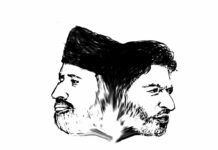
Modern approaches to study the religious legacies has had an adverse impact upon Muslim intellectuals since 1860 AD. This influence is evident and could be felt even in the diverse aspects of Islamic learning; be it Quranic Exegesis (Tafsir), life of Prophet Muhammad (PBUH) (Sirah) or Muslim Historiography (Ilm al- Tarikh), Modernism (Jadidiyat/Tajadud) made its way to the Muslim domains way back in late 18th century, with the advent of British and French interaction. Since then, Muslim monarchs and secular intellectuals of Egypt got influenced by diverse aspects of the scientific and philosophical trend. Modernism as philosophy had many new things to offer and certain other things to criticize. The same trend entered the Ottoman Turkey in early 19th century to modernize administrative and educational institutions (Tanzimat). Apart from that, the western-modernist critical thought had already crept into the academic approach to study Islamic studies and set a framework for future discourse. The orientalistic approach to study Islamic studies and evolution of the Chairs for Asiatic/Far Eastern studies in Europe was the result of this significant move.
The Muslim art of interpretation and analysis of data had its own spectrum visualizing the entire realm of scholarship in Islamic studies. Consequently, in the Islamic literature are evidences of numerous scholastic approaches which are yet to be considered as the contribution of Muslims. By 1860 AD, an intense colonial pressure along the scientific assessments encroached Muslim intellectual legacies, resulting in production of ‘humanistic world view’ content into the religious literature. The Judeo-Christian polemics were applied as a methodological tool for the study of Eastern religions especially Islam. With the inception of foreign societies from 1833 AD onwards, modern Sirah (Biography of the Prophet) authors tried to present the Prophet (PBUH) much identical with ‘human aspect’. This approach of evaluation overshadowed the ‘revealed aspect’ stressing to study the Prophet as administrator, economist, politician and missionary. (See Bennett Clinton in Search of Jesus, New York 2001, Ibn Warraq, Studies on Muhammad & Rise of Islam, New York, 2000, Prometheus Books, JW F?ck, Islam as an Historical problem in European Historiography since 1800, OUP, London). Many Muslim intellectuals emerged eventually who fell victim to this critical approach and wrote on Islam with the same attitude. Same approaches were applied to renowned books on Muslim history and islamic jurisprudence. The critical historical research, as a familiar and approved method, was erroneously applied to the Islamic Studies (See Ibn al- Rawandi, Origins of Islam: A Critical look at the sources, in The Quest of the Historical Muhammad, ed. Ibn Warraq, New York, 2000).
The Muslim art, architecture and social systems are identical with a proper scheme of ideas. The intellectual modernism since 20th century has been dominating the Muslim thought in a very sophisticated manner. The term “traditional” is not in itself an abuse, rather a reference point for self identification and confirmation in the historical process. Islamic literature needs attention as well as a proper understanding viz-a-viz its emergence. Unfortunately, infected by critical approach, even the contemporary Muslim scholars try to exclude the miraculous nature of Quran. This intellectual crucification of the events and ideas can prove lethal to the Islamic studies and will lessen its scope and peculiarity.
Dr Showkat Hussain is an assistant professor and in-charge Head of Department of Islamic Studies, Islamic University of Science and Technology, Awantipora.















